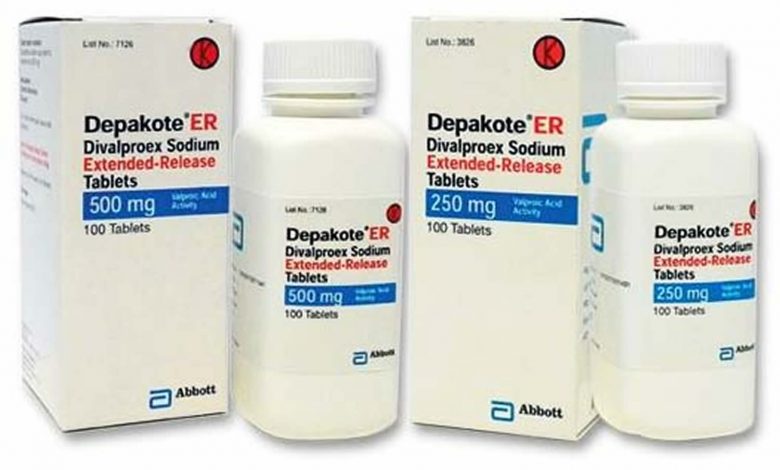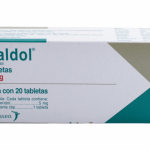Valproate (Depakote): Uses, How it works, Dosage, Side Effects

What Is Valproate (Depakote) And What Does It Treat?
Valproate (Depakote) is an anticonvulsant approved for the treatment of mania associated with bipolar disorder (also known as manic depression), seizures (epilepsy), and migraine headaches. Bipolar disorder involves episodes of depression and/or mania.
Valproate (Depakote) may also be helpful when prescribed “off-label” for diabetic peripheral neuropathy, postherpetic neuralgia, status epilepticus, and some conditions related to a traumatic brain injury (agitation, aggression, and seizure prevention). “Off-label” means that it hasn’t been approved by the Food and Drug Administration for this condition. Your mental health provider should justify his or her thinking in recommending an “off-label” treatment. They should be clear about the limits of the research around that medication and if there are any other options.
How Valproate (Depakote) works
Scientists do not know the mechanism of action of Valproate (Depakote). The most popular theory is that Valproate (Depakote) exerts its effects by increasing the concentration of gamma-aminobutyric acid (GABA) in the brain. GABA is a neurotransmitter, a chemical that nerves use to communicate with one another.
What Is The Most Important Information I Should Know About Valproate (Depakote)?
Bipolar disorder requires long-term treatment. Do not stop taking valproate, even when you feel better. With input from you, your health care provider will assess how long you will need to take the medicine. Missing doses of valproate may increase your risk for a relapse in your mood symptoms.
Do not stop taking valproate or change your dose without talking to your healthcare provider first.
In order for valproate to work properly, it should be taken every day as ordered by your health care provider.
Periodically, your healthcare provider may ask you to provide a blood sample to make sure the appropriate level of medication is in your body and to assess for side effects, such as changes in blood cell counts.
What Should I Discuss With My Healthcare Provider Before Taking Valproate (Depakote)?
• Symptoms of your condition that bother you the most
• If you have thoughts of suicide or harming yourself
• Medications you have taken in the past for your condition, whether they were effective or caused any adverse effects
• If you experience side effects from your medications, discuss them with your provider. Some side effects may pass with time, but others may require changes in the medication.
• Any other psychiatric or medical problems you have
• All other medications you are currently taking (including over the counter products, herbal and nutritional supplements) and any medication allergies you have
• Other non-medication treatments you are receiving, such as talk therapy or substance abuse treatment. Your provider can explain how these different treatments work with the medication.
• If you are pregnant, plan to become pregnant, or are breast-feeding
• If you drink alcohol or use illegal drugs
How Should I Take Valproate (Depakote)?
Valproate (Depakote) is usually is taken 1-3 times daily with or without food.
Typically, patients begin at a low dose of medicine and the dose is increased slowly over several weeks.
The dose usually ranges from 1000 mg to 3500 mg or more. Only your health care provider can determine the correct dose for you, as sometimes the dose required is based on your weight.
Valproate (Depakote) tablets: Swallow whole. Do not crush, chew or split tablets.
Depakote Sprinkle® capsules: Swallow whole or sprinkle onto food, such as applesauce or pudding and eat immediately. Do not chew the sprinkle capsule or contents.
Valproate (Depakote) syrup: Measure with a dosing spoon or oral syringe that you can get from your pharmacy.
Use a calendar, pillbox, alarm clock, or cell phone alert to help you remember to take your medication. You may also ask a family member or a friend to remind you or check in with you to be sure you are taking your medication.
What Happens If I Miss A Dose Of Valproate (Depakote)?
If you miss a dose of valproate, take it as soon as you remember, unless it is closer to the time of your next dose. Discuss this with your health care provider. Do not double your dose or take more than what is prescribed.
What Should I Avoid While Taking Valproate (Depakote)?
Avoid drinking alcohol or using illegal drugs while you are taking valproate. They may decrease the benefits (e.g., worsen your condition) and increase adverse effects (e.g., sedation) of the medication.
What Happens If I Overdose With Valproate (Depakote)?
If an overdose occurs, call your doctor or 911. You may need urgent medical care. You may also contact the poison control center at 1-800-222-1222. A specific treatment to reverse the effects of valproate does not exist.
How Long Does It Take For Valproate (Depakote) To Work?
It is very important to tell your doctor how you feel things are going during the first few weeks after you start taking valproate. It will probably take several weeks to see big enough changes in your symptoms to decide if valproate is the right medication for you.
Mood stabilizer treatment is generally needed lifelong for persons with bipolar disorder. Your doctor can best discuss the duration of treatment you need based on your symptoms and illness.
Can a pregnant woman take Valproate (Depakote)?
If you are planning on becoming pregnant, notify your healthcare provider so that he/she can best manage your medications. People living with bipolar disorder who wish to become pregnant face important decisions. It is important to discuss the risks and benefits of treatment with your doctor and caregivers.
Valproate (Depakote) has been associated with an increased risk of spinal cord defects (spina bifida). Bleeding, liver problems, decreased IQ scores, developmental delays, and other birth defects have also been reported. There may be precautions to decrease the risk of these effects. Discontinuing mood stabilizer medications during pregnancy has been associated with a significant increase in symptom relapse.
Can a breastfeeding woman take Valproate (Depakote)?
Regarding breastfeeding, caution is advised since valproate does pass into breast milk in small amounts. Studies reveal no definite adverse reactions to Valproate (Depakote) acid in breastfed infants have been reported. Theoretically, breastfed infants are at risk for valproic acid-induced hepatotoxicity, so infants should be monitored for jaundice and other signs of liver damage during maternal therapy.
What Are The Possible Side Effects Of Valproate (Depakote)?
Common side effects
• Nausea or vomiting
• Headache
• Drowsiness or dizziness
• Tremor
• Muscle weakness
• Insomnia
• Hair loss
• Weight gain
• Diarrhea or abdominal pain
Rare/serious side effects
• Liver problems
• Low platelets. Platelets help the blood to clot. Bruising easier than normal is a symptom of low platelets
• Pancreatitis (inflammation of the pancreas). Symptoms of pancreatitis include severe stomach pain, nausea, vomiting, and not feeling hungry
• Increased ammonia levels. If this happens, you may get confused, disoriented, or have difficulty thinking.
Studies have found that individuals who take antiepileptic medications including valproate have suicidal thoughts or behaviors up to twice as often as individuals who take placebo (inactive medication). These thoughts or behaviors occurred in approximately 1 in 500 patients taking the antiepileptic class of medications. If you experience any thoughts or impulses to hurt yourself, you should contact your doctor immediately.
Are There Any Risks For Taking Valproate (Depakote) For Long Periods Of Time?
To date, there are no known problems associated with the long-term use of valproate. It is a safe and effective medication when used as directed.
It is important to note that some of the side effects listed above (particularly changes in platelets, liver or pancreas problems, and suicidal thoughts) may continue to occur or worsen if you continue taking the medication. It is important to follow up with your doctor for blood work and to contact your doctor immediately if you notice abdominal pain, sudden nausea or vomiting, or changes in mood or behavior.
What Other Medications May Interact With Valproate (Depakote)?
Combining valproate with topiramate (Topamax®) may increase ammonia levels in your blood. If this happens, you may get confused, disoriented, or have difficulty thinking.
The following medications may increase the level and effects of valproate:
• Aspirin (high doses to treat fever or pain)
The following medications may decrease the level and effect of valproate:
• Anticonvulsant medications such as phenytoin (Dilantin®), carbamazepine (Tegretol®/Carbatrol®/Equetro®), and phenobarbital
• Rifampin (Rifadin®)
• Certain antibiotics, such as ertapenem (Invanz®) or meropenem (Merrem®)
Valproate (Depakote) may increase the level and effects of:
• Antidepressant medications such as amitriptyline (Elavil®) and nortriptyline (Pamelor®)
• Anticonvulsant medications such as phenytoin (Dilantin®), carbamazepine (Tegretol®/Carbatrol®/Equetro®), rufinamide (Banzel®), ethosuxamide (Zarontin®), and especially lamotrigine (Lamictal®).
• Diazepam (Valium®)
Valproate (Depakote) may decrease the level and effects of:
• Olanzapine (Zyprexa®)
• Oxcarbazepine (Trileptal®).





